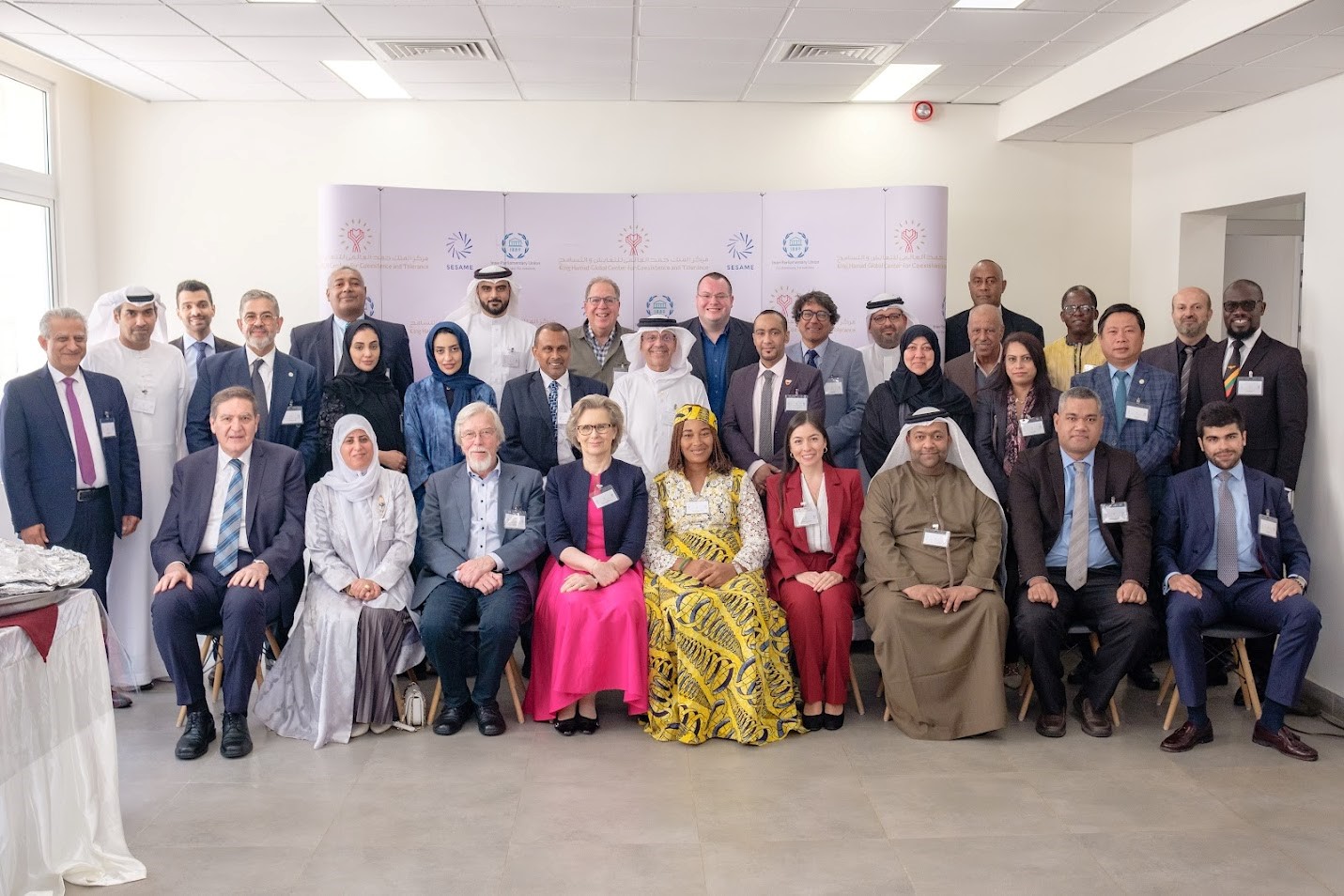
From May 5, 2025 to May 8, 2025, SESAME was the proud host of the 2025 edition of the Inter-Parliamentary Union (IPU) Science for Peace Schools (SFPS), which brought together over 45 parliamentarians, scientists, and thought leaders from around the world concerned with science, policy, and diplomacy. This year’s theme, “Understanding Artificial Intelligence and its Impact on Parliamentary Work: AI, Human Consciousness and Ethics”, reflected the growing urgency for global leaders to grapple with the transformative—and at times disruptive—power of AI.
The week-long program opened with an introductory message from Ms. Margareta Cederfelt, President of the IPU Working Group on Science and Technology and a Member of the Parliament of Sweden, on how parliaments across the globe must make conscious efforts to be informed and equipped with knowledge about AI. “We cannot afford to be passive observers in the AI revolution,” she stated, “Parliamentarians must be informed, equipped, and empowered to legislate responsibly in the face of fast-evolving technologies.”
In his welcome address, Professor Rolf Heuer, President of the SESAME Council, emphasized the critical role of transnational collaboration in advancing scientific discovery and fostering regional unity. Emphasizing SESAME’s uniqueness as “a beacon of advanced science and science diplomacy in the region and a place where cutting-edge research and peaceful cooperation converge”, he underscored the unique power of science to transcend political divides and create a shared foundation for mutual understanding and long-term peace. “We are not only building knowledge”, he said, “but also trust across borders”.
Dr. Khaled Toukan, Director of SESAME, highlighted the facility’s regional significance. “SESAME represents more than a research facility”, he stated. “It is a model for scientific cooperation in a region often marred by conflict. We have shown that science can serve as a neutral platform for peace.” His remarks reflected the broader vision behind SESAME — using science not only to advance knowledge, but also to foster dialogue and unity across borders.
Participants in the School delved into an intensive schedule of modules that blended theory, technical knowledge, and practical applications focused on AI’s role in communication, legislative research, policy development, and administrative efficiency in parliamentary work. Experts led live demonstrations on tools for real-time translation, document summarization, and AI-assisted information management.
Professor Patrick Glauner, from the Deggendorf Institute of Technology in Germany, emphasized that understanding AI’s inner workings was crucial for decision-makers. “We need to move beyond the buzzwords. Parliamentarians should feel confident engaging with AI—not intimidated by it”, he urged.
Mr. Yassine Elagdi, IT consultant and AI expert with the IPU, introduced practical tools for automating parliamentary tasks, showing how AI can streamline workflows without undermining human judgment. “It’s about making AI a helpful partner, not a silent master”, he said.
The program’s signature sessions were the class projects, which challenged participants to examine how AI can transform conflict into coexistence and serve humanity in ethical and inclusive ways. Drawing from their legislative experience and regional knowledge, MPs engaged in role-play exercises, drafted reports, and explored the concept of “positive peace” in the digital age.
His Excellency Mr. Ali Abdulla Al Aradi, Deputy Chairman of the King Hamad Global Center for Coexistence and Tolerance (KHGC), reaffirmed Bahrain’s dedication to harnessing modern technologies and artificial intelligence to promote peace, dialogue, and sustainable development. Speaking on the launch of two AI-based initiatives, “AI Assistant 1” and “AI Participant 1”, as part of the Science for Peace School at SESAME, he emphasized that these efforts reflect the vision of His Majesty King Hamad bin Isa Al Khalifa and the strategic directives of His Royal Highness Prince Salman bin Hamad Al Khalifa, the Crown Prince and Prime Minister of Bahrain.
In his remarks, HE Mr. Al Aradi underscored Bahrain’s commitment to pioneering smart tools that enhance parliamentary and legislative work, as part of a broader mission to institutionalize tolerance and understanding. He highlighted the importance of global collaboration, praising the Inter-Parliamentary Union and the SESAME for their roles in advancing scientific and technological cooperation. The Deputy Chairman also voiced support for an international treaty on AI governance, aiming to ensure that innovation is used to promote peace, development, and shared prosperity.
Ms. Aminatou Ngangoube, an MP from Cameroon, noted, “This experience is about hope. It’s about the possibility of using AI not just to solve problems, but to transform societies. We’re rethinking governance through the lens of empathy and inclusion.”
Mr. Carlos Alvarez Pereira, Secretary General of the Club of Rome, challenged participants to think about AI not only as a tool but as a mirror of society. “How we design and use AI will reveal our values”, he said. “And right now, we need values rooted in human dignity, not just efficiency.”
One particularly thought-provoking session was the “Illuminating Coexistence: The Power of Light—Science, Photography and Human Consciousness” session. In this inspiring exploration of science and art, renowned photographer Frank Dabba and SESAME’s Scientific Director, Andrea Lausi, led participants in reflecting on how light—both physical and symbolic—shapes human memory, perception, and empathy.
As the program drew to a close, a new initiative—the Alumni Scientific Network—was launched to ensure ongoing collaboration among members. The network aims to facilitate continued dialogue on AI, ethics, and scientific legislation, building a community of forward-looking parliamentary leaders.
Mr. Mokhtar Omar, Senior Advisor to the IPU Secretary General, summarized the event’s impact as follows: “This is more than a training event. It’s the beginning of a movement. We are nurturing a global cadre of parliamentarians who are not only tech-savvy but peace-minded. The future of democracy depends on this dual commitment.”

